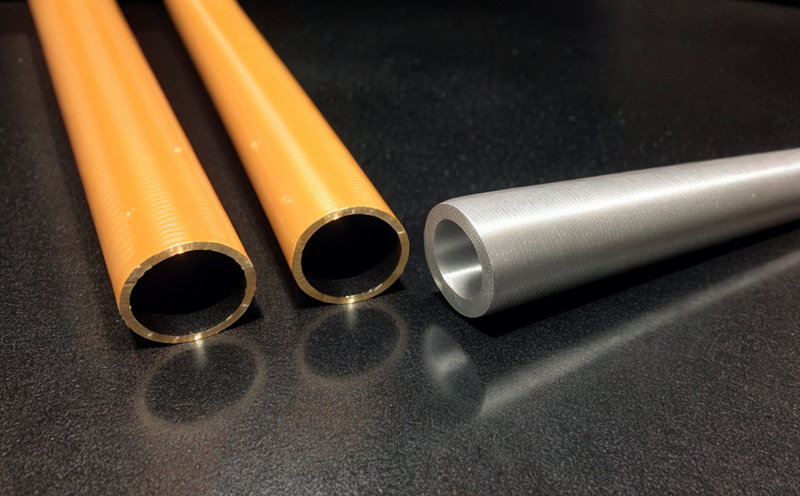Thermal Expansion Behavior Measurement
The thermal expansion behavior measurement is a critical process in aerospace and aviation testing. This procedure involves assessing how materials or composite parts expand or contract under varying temperatures. Understanding this property ensures the reliability, durability, and performance of components used in aircraft structures, engines, and avionics.
Thermal expansion plays a significant role in the design and manufacturing of aerospace equipment where extreme temperature variations are common. For instance, engine components must withstand high-temperature exhaust gases while maintaining structural integrity. Similarly, composite materials such as carbon fiber reinforced polymers (CFRP) used in aircraft wings require precise thermal expansion measurement to ensure they perform optimally under diverse environmental conditions.
The process typically begins with specimen preparation, where the material is cut into a standard sample size suitable for insertion into an expansion device. The samples are then placed within a controlled environment chamber that can simulate real-world temperature changes from -60°C up to 250°C or higher depending on the application.
The chosen instrumentation must be capable of accurately measuring these minute dimensional changes with high precision. Commonly used devices include dilatometers, thermal expansion testers, and laser interferometers. These instruments provide data points that are analyzed to determine the linear expansion coefficient (α) over a specified temperature range. The results help engineers predict how materials will behave under different operational conditions.
Aerospace & aviation industries rely heavily on accurate thermal expansion measurements because even small deviations can lead to significant issues such as premature failure or reduced lifespan of critical components. Compliance with international standards like ISO 9760-1:2015 and ASTM E428 is essential for ensuring consistent quality across manufacturing processes.
By conducting thorough thermal expansion behavior measurements early in the development cycle, manufacturers can identify potential problems before proceeding to further stages of production or certification. This proactive approach not only enhances product reliability but also reduces costly rework and delays associated with late-stage adjustments.
Why Choose This Test
Selecting thermal expansion behavior measurement is crucial for several reasons, particularly when dealing with the unique demands of aerospace & aviation components. Firstly, it allows manufacturers to ensure that their materials will perform consistently across a wide temperature range without undergoing unacceptable dimensional changes.
- Enhanced Reliability: By accurately measuring thermal expansion, engineers can design parts that maintain critical tolerances throughout their operational life cycle.
- Predictive Analysis: Understanding how materials respond to temperature fluctuations enables better prediction of long-term performance and potential failure points.
- Compliance Assurance: Adherence to international standards ensures consistency in testing methods, which is vital for regulatory approval and certification processes.
In addition to these benefits, choosing thermal expansion behavior measurement also supports continuous improvement efforts within the organization. Regular assessments allow teams to refine manufacturing techniques and select more suitable materials based on actual performance data rather than theoretical models alone.
For quality managers and compliance officers responsible for ensuring product integrity across various applications, this service provides peace of mind knowing that every component meets stringent requirements set by industry regulations. Furthermore, R&D engineers can leverage the insights gained from these tests to innovate more efficient designs capable of handling increasingly challenging environmental conditions.
International Acceptance and Recognition
The importance of thermal expansion behavior measurement in aerospace & aviation testing is globally acknowledged through adherence to internationally recognized standards such as ISO 9760-1:2015, ASTM E428, and EN 316. These guidelines provide clear protocols for conducting accurate measurements under controlled conditions, ensuring consistency across different laboratories worldwide.
Compliance with these standards is not only beneficial from a technical standpoint but also essential for meeting stringent regulatory requirements imposed by authorities like the Federal Aviation Administration (FAA) in the United States and the European Union Aviation Safety Agency (EASA). Meeting these criteria enhances credibility among stakeholders, including customers, suppliers, and regulators.
Additionally, participating in international collaborative projects often requires adherence to these accepted practices. Engaging with global partners who follow similar standards facilitates smoother collaboration and mutual trust, fostering innovation within the industry.
Furthermore, compliance with recognized standards demonstrates a commitment to excellence that can positively influence brand reputation and customer confidence. As environmental regulations become stricter globally, adhering to established protocols becomes increasingly important for maintaining competitive edge in the marketplace.
Competitive Advantage and Market Impact
Accurate thermal expansion behavior measurement offers several advantages that contribute significantly to a laboratory's competitive position within the aerospace & aviation sector. Below are some key points highlighting the market impact:
- Innovation Leadership: By staying ahead of industry trends and continuously improving testing methodologies, laboratories can offer more advanced solutions tailored specifically for current challenges faced by manufacturers.
- Cost Efficiency: Early identification of potential issues through thorough thermal expansion measurements helps avoid costly rework and delays in product development cycles.
- Market Differentiation: Providing high-quality, reliable data enhances a laboratory's reputation among clients seeking assurance about the performance capabilities of their materials or components.
- Customer Satisfaction: Consistent compliance with international standards coupled with accurate measurements ensures that customers receive products they can trust, leading to higher levels of satisfaction and loyalty.
The ability to provide comprehensive thermal expansion behavior measurement services sets laboratories apart from competitors by offering a full suite of testing capabilities essential for the aerospace & aviation industries. This holistic approach not only meets but exceeds customer expectations while driving innovation within the sector.
Moreover, labs that excel in this area are well-positioned to capture new opportunities arising from emerging trends such as sustainable aviation fuel research and development or advancements in lightweight materials technology. By investing in advanced equipment and skilled personnel dedicated solely to thermal expansion behavior measurement, laboratories can position themselves at the forefront of technological progress.





